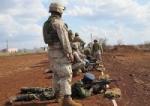I wanted to share some of my observations on an issue that has become a major topic for Army leaders – officer retention. In the Army we hear a lot about retaining company grade officer and there have been a number of actions taken over the past few years to mitigate the high demand for company grade officers with their requirements.
These actions include eliminating OER (Officer Evaluation Report) blocking, promotion to captain at 39 months, expanded advanced civil schooling programs, extremely high promotion rates (99%) to captain and major (94-98%) and other proposals, i.e. bonuses for additional years of service.
The last proposal of bonus was generally taken as an insult. The $20,000 proposal for a captain translated into four months of pay, while junior enlisted bonuses sometimes equal their entire annual salary. Most of the captains took the proposal as half hearted from a bureaucracy that doesn’t ask their input nor solicit it. The measly amount of $20,000 was never going to entice any captain on the fence to stay in the Army, but would have been good for captains that had every intention of staying. For those that have made multiple deployments it would have been well earned.
So we’ve essentially created a system that doesn’t eliminate poor performers and promotes almost everyone. The captain’s are smart and they see weak performers getting promoted. Frankly, I’d rather see an unfilled assignment then fill it with a poor performer. I would prefer we protect our officer corps’ quality from weaklings by culling them out as we’ve done in the past.
If we’re serious about retaining company grade officers then let’s give them an incentive like $50,000 tax free or a guarantee of graduate degree of their choice in a school of choice or assignment of choice with Army schools of choice. It’s not about pleasing everyone; it’s about recognizing what’s at stake long term and making an appropriate commitment.
The first who get these options ought to be those officers who have made multiple deployments to combat. The combat issue brings to the surface a secondary topic. There are officers hiding in the Army who have avoided combat deployments. Whether they’re hiding in the training base (TRADOC), institutional, high headquarters, Korea, or some other place is irrelevant. After nearly 6 years of war there are too many officers with 2 or 3 deployments and others with none. Since the promotion rates are so high for captain, major, and lieutenant colonel there is no disincentive for not deploying, so they hide. Combat deployments are NOT about punching tickets, slapping on a right-shoulder patch and some medals or some other non-sense especially after nearly 6 years of war. At some point equity of deployment has to be factored. If someone thinks an officer should not be deployed because he/she is weak then they need to get a job at Wal-Mart and not in the Army. If an officer is afraid to deploy because of family separation or fear of combat Wal-Mart is hiring.
The problems in the company grade ranks will not stop there but will expand into the field grade ranks. As the Army promotes marginal performers to major and lieutenant colonel there is a negative incentive to all officers who see weak mid and senior grade officers. Just as incentives are important to retain company grade officers, the same applies to field grade officers. How much are you willing to provide to keep solidly performing majors and lieutenant colonels past 20 years? Right now the Army offers nothing. There are no incentives, other than the promise of promotion or command and for the vast majority these two incentives will never happen. But the Army needs a deep pool of experienced officers to stay beyond 20 years there is nothing to keep them and they, like the company grade officers, are exiting rapidly.
If we’re fighting a new war with a new modular Army using new tactics, equipment, and a new mindset it’s probably time to develop a new way of rewarding performance and a new way of sustaining the force to actually sustain the force. If the promotion rate to captain is 99% why have a centralized board? If the promotion rate to major is 98% why have a board? Under the current system the first time the Army tell an officer he’s not going to “make it” is the battalion command board in year 16 or 17.








 "A Sherman can give you a very nice... edge."- Oddball,
"A Sherman can give you a very nice... edge."- Oddball, 





 .
. 

Bookmarks